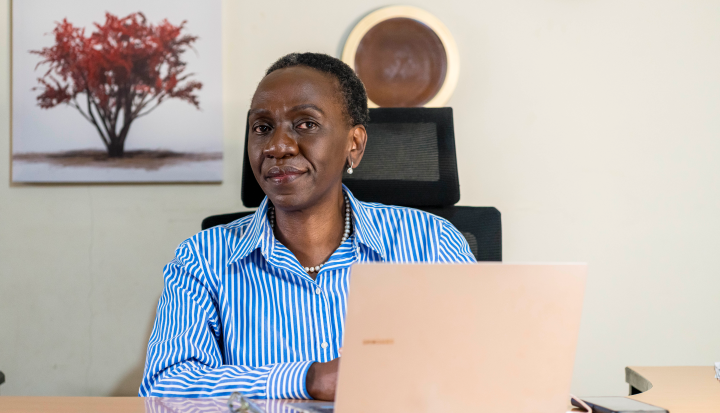Digital inclusion is key to economic justice, but women are lacking in connectivity
The complex issue of women's economic equality is often trivialized in conversations about equal pay and representation in the boardroom.
As a female leader, I certainly understand the value of these topics. But the intersection of patriarchy, institutional inequality, sexist attitudes, and access to digital tools makes them even more intimidating. Main factors There is little discussion of the economic gender gapBy not exploring and pursuing solutions to these challenges, we are leaving half of our population behind – a mistake we cannot afford.
Late last year, more than 1,100 women entrepreneurs across 81 low- and middle-income countries shared their experiences with the Cherie Blair Foundation for Women, and their responses were collated in a new research report called “Bridging the Gap: Women, Technology and Business Success,” released this week on International Women's Day.
Our research Women rely more heavily on digital tools in business92.1% use the internet frequently, mostly via smartphone. The study also uncovers a number of potentially devastating barriers that prevent women from accessing digital tools, leading to an uneven playing field in business.
It's clear that digital platforms, connectivity and e-commerce are becoming increasingly important business tools. Nearly a quarter (24.4%) of women surveyed highlighted greater digital inclusion as a key driver of their business success, and nearly a third (32.8%) cited improved access to business networks, including virtual networks, as a factor in their success. Moreover, technology spending among women entrepreneurs is on the rise, predicted to grow by 37.2% in 2024.
Nevertheless, internet costs and network interruptions remain significant barriers to internet access for women, with 69.1% and 67.3% reporting these issues, respectively. This is an increasingly big obstacle as financial transactions, marketing activities, and other business functions move online.
Yvonne Okrospoma, who runs L&L Translation Services in Guyana and learned about mobile money using the foundation's business skills app, HerVenture, put it aptly: “Technological advances are changing the world and the way we do business, so we have to keep up.”
Technology brings opportunities, but we must not ignore the risks
Emerging technologies such as mobile money and AI can be valuable tools for women entrepreneurs. 44.4% of women entrepreneurs surveyed said they have already implemented AI tools in their business.This indicates a positive trend towards adopting advanced technologies for various business purposes.
but, 65.5% of survey respondents cited lack of training as a major barrier to AI adoption. This highlights the importance of educational efforts to increase women's understanding and proficiency in leveraging AI tools for small business development.
While digital tools bring benefits to businesses, they can also put women entrepreneurs at risk. It's no secret that the world is not safe for women, and the digital space is no exception.
Women entrepreneurs face multiple forms of gender discrimination, including digital gender-based violence (GBV), which can include online harassment, stalking, exploitation and other harmful behaviour. Nearly seven in 10 women surveyed (67.4%) reported having personally witnessed or experienced online GBV in the past year. And many shared their first-hand experiences with harmful online behavior that targets women. Nearly half of respondents (45.4%) reported that instances of online GBV have affected the success of their business..
Digital GBV is not the only online discrimination women entrepreneurs face. Algorithms are often trained on biased datasets, which can lead to discriminatory outcomes. This can impact women's ability to access capital, which is already the biggest challenge for women entrepreneurs, as reported by more than a quarter of women (25.6%).
Closing both the digital and economic gender gaps means calling out and combating online violence against women, and ensuring that women can safely access business-related online spaces without fear of harassment and discrimination.
Ending GBV does not require a business case justification, but with GBV impacting economies worth US$1.5 trillion each year according to UN Women, the scale of the opportunity across multiple sectors is clear.
We call on the private sector to step up to close the gap.
The private sector has a key role to play in helping women entrepreneurs succeed in an ever-changing business environment. Companies can and must take action now to close the gender gap in entrepreneurship and address the issues that perpetuate it. When you look at the scope and impact of our collaborations with partners like DHL Express and PayPal to support digital literacy, networks and access to finance for thousands of women, you know it can be done.
This International Women's Day, we call on private organisations to invest in female entrepreneurship and create a more level playing field for women business owners. In addition to directly investing and providing capital to women-owned businesses in low- and middle-income countries, companies should work to partner with government agencies, nonprofits and multilateral organizations to provide critical training, support programs and services to women entrepreneurs.
We encourage the private sector to seek to develop a more nuanced understanding of local markets in low- and middle-income countries in terms of the needs and spending patterns of women entrepreneurs, and encourage the private sector, with the support of government agencies and NGOs, to develop partnerships between local networks of women entrepreneurs in low- and middle-income countries and values-driven investors around the world.
Download the research report to find out more about how your organization can get involved.
Read more articles about closing the digital gender gap:

